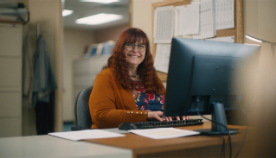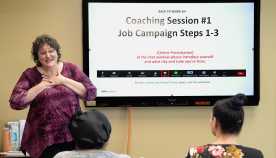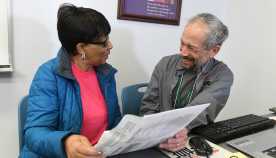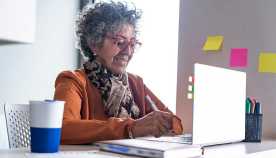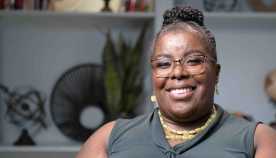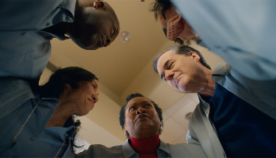About Us


Deidre Champion, 61, is rebooting her life.
Years of joblessness, caused by a layoff and the coronavirus pandemic, forced her to live with family and friends — just the latest in a series of setbacks Deidre has experienced.
Born and raised on Chicago’s South Side, she was five when her parents divorced, and she grew up fretting that it had been her fault. So she dedicated herself to being perfect. “I was an honor roll kid because I was trying to survive, not because I was Einstein,” she explains. “I knew it was what my mother wanted. My father had already left, and I didn’t want her to leave, too.”
Her academic success led her to Washington, D.C., where she attended Howard University, a historically Black college. “I loved living in D.C.,” she says. But an unexpected pregnancy changed her plans and sent her back to Chicago. “It’s where my mother was, and I knew I was gonna need support.”
The Costs of Caregiving
When her mother was diagnosed with Alzheimer’s disease 10 years later, it was Deidre’s turn to provide support, which included bringing her mother to live with her, her daughter, and her then-husband.
It wasn’t easy. “I was trying to manage my mother’s health when she didn’t even recognize who I was anymore,” Deidre says. What’s more, she had racked up a lot of work absences because her mother, like many people with Alzheimer’s, had started wandering. She believes those absences cost her the job she had held for 11 years — but, she says, “I couldn’t not go.”
In time, she was told her position had been eliminated. “I think they just wanted to call it that because it sounded better than ‘we’re firing you because you had too many absences,’” she says.
Ultimately, Deidre made the difficult decision to place her mother in a nursing facility for her own safety; she died in 2010. Not long after that, Deidre’s daughter went off to college, her marriage went to divorce court, and Deidre went on public assistance to tide her over until she found another job.
Search…
Then, in 2019, another setback: The job she found was eliminated when her department was absorbed into another. “They gave me six months’ severance and let me go,” she says. “About four months into my severance was when the pandemic was full throttle. And now I was stuck.”
More than a year of unsuccessful searching left her feeling defeated. “I was submitting résumés everywhere, but it’s heartbreaking and hard to stay motivated after you get 20 or 30 rejections,” she says.
Then she found the YWCA Metropolitan Chicago and met Workforce Empowerment Specialist Erin Vaughn — and that’s when things started to turn around.
Erin introduced Deidre to AARP Foundation’s Digital Skills Ready@50+™ initiative, which offers free tech skills training for people over 50 who have low income. Launched in 2022 through a grant from Google.org, it focuses heavily on women and people of color, who historically experience higher rates of discrimination in employment.
“I made sure I was at all the classes because I needed to open a door somewhere, and fast,” Deidre says. “It gave me a chance to brush up on some technology and find out about resources, like job fairs that I didn’t even know existed until I went through this program.”
… and Rescue
Just weeks after finishing the program, Deidre was offered a full-time position as an office administrator for a health care association. But a bigger surprise was waiting.
“I was looking for a salary that was several thousand less than I had at my last job,” she says. “I thought I was going to have to take a step back just to get employed full time again, especially at 61 years old.”
The offer was several thousand more than she was making before. “It was an opportunity I never imagined for myself!” she says.
The Digital Skills Ready@50+ training gave her the tools she needed for the job, including how to use video chat and video conferencing software. She was able to apply what she learned to Microsoft Teams, which combines chat, video meetings, phone calling, and file sharing to enhance collaboration. “I was pretty familiar with Microsoft Office Suite, but I didn’t know how to use Teams,” she explains. “Now it’s my lifeblood at work. I could not do my job without it.”
With her great new job and salary, Deidre, who’d been living with friends and family, was recently able to move into her own place and, she says, “exhale for the first time in years.”
“I’m grateful to be here, even in this empty apartment that I have to fill up from the floor!” she says. Though small, her junior one-bedroom in a stylish downtown neighborhood is convenient, safe, and all hers. She calls it “571 square feet of peace of mind.”
Deidre’s daughter is 29 now and lives on the East Coast, where Deidre says she’s “fabulously independent, doing all the things that I hoped she would do when I was raising her. She’s doing her thing, and I’m trying to put my thing back together at my big age,” she says, laughing.
“But I know this: 61 is a privilege that’s been denied to many,” she adds. “I feel really privileged to be here, and I’m looking forward to as many more as I can collect.”
Learn more about the Digital Skills Ready@50+ initiative and build the skills and confidence to navigate the evolving technology landscape.
Read more stories about how our programs have helped people find hope, and about the volunteers who give so much of themselves to help others.


